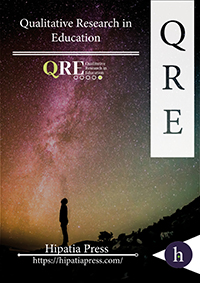The Students Portfolio as an Alternative Strategy to the Standardized Competencies Assessment Tests
Keywords:
Downloads
Abstract
This paper is part of a wider research, which focuses on education competencies assessment (I+D Research Project, ref. SEJ-2007-66967), funded by the Spanish Ministry of Education. What we show in this paper are data from one of the case studies we carry out as part of this project. We have developed a "collaborative research" to understand and analyze the educational processes taking place in the "learnings of second order" ("learning how to learn"). In this sense, we've performed a didactic experimentation with portfolios of student in a 5th grade classroom; the conclusions presented are the result of this particular study. As a final, we conclude that portfolios of student can be an interesting strategy for educational evaluation; as well as it can become an "alternative strategy" to the standardized competency assessment tests, which predominate in the current educational landscape.
Downloads
References
Alfageme, M.B. (2007). El portafolio reflexivo: metodología didáctica en el EEES. Revista Educatio XXI, 25, 209-226.
Google Scholar CrossrefÁlvarez, J.M. (2003). La evaluación a examen: Ensayos críticos. Buenos Aires: Miño y Dávila.
Google Scholar CrossrefArea, M. (2004). Sociedad de la información, tecnologías digitales y educación: luces y sombras de una relación problemática. In A. Bautista (Coord.). Las nuevas tecnologías en la enseñanza. Temas para el usuario. (193-223). Madrid: Unia/Akal.
Google Scholar CrossrefBeane, J. A. (1997). Curriculum Integration: Designing the Core of Democratic Education. New York: Teachers College Press.
Google Scholar CrossrefBiggs, J.B. & Tang, C. (2007). Teaching for Quality Learning at University. Maidenhead: Open University Press/Mc Graw-Hill Education.
Google Scholar CrossrefColl, C.; Mauri, T. & Rochera, M.J. (2012). La práctica de evaluación como contexto para aprender a ser un aprendiz competente. Revista Curriculum y Profesorado, vol. 16 (1), 49-59.
Google Scholar CrossrefCumming, J. J. & Wyatt-Smith, C. M. (2009) Framing Assessment Today for the Future: Issues and Challenges. In J.J. Cumming & C.M. Wyat-Smith (Eds.) Educational Assessment in the 21st Century. Springer: Nueva York.
Google Scholar CrossrefDeSeCo (2005). La definición y selección de competencias clave. Resumen ejecutivo. OCDE.
Google Scholar CrossrefGallardo, M.; Fernández, M.; Sepúlveda, M.P.; Serván, M.J.; Yus, R. & Barquín, J. (2010). PISA y la competencia científica. Un análisis de las pruebas de PISA en el área de Ciencias. RELIEVE: Revista Electrónica de Investigación y Evaluación Educativa, vol.16 (2), 1-17, http://www.uv.es/RELIEVE/v16n2/RELIEVEv16n2_6.htm.
Google Scholar CrossrefGarcía, M. (2012). La autorregulación académica como variable explicativa de los procesos de aprendizaje universitario. Revista Profesorado, vol. 16 (1), 203-221.
Google Scholar CrossrefGimeno, J. (2008). Educar por competencias. ¿Qué hay de nuevo? Madrid: Morata.
Google Scholar CrossrefGonzález, N. (Coord.) (2007). Desarrollo y evaluación de competencias a través del portafolio del estudiante. Cantabria: Vicerrectorado de Calidad e Innovación Educativa. University of Cantabria.
Google Scholar CrossrefHargreaves, D.H. (2007). Personalising Learning 3: Learning to Learn & the New Technologies. London: Specialist Schools Trust.
Google Scholar CrossrefUNESCO World Report (2005). Towards Knowledge Societies. United Nations Educational, Scientific and Cultural Organization.
Google Scholar CrossrefJornet, J.M.; García, R. & González, J. (2012). Evaluar la competencia Aprender a Aprender: Una propuesta metodológica. Revista Curriculum y Profesorado, vol. 16 (1), 103-123.
Google Scholar CrossrefKlenowski, V. (2002). Developing Portfolios for Learning and Assessment. Maidenhead: Open University Press/Mc Graw-Hill Education.
Google Scholar CrossrefPérez, Á.I. (1998). La cultura escolar en la sociedad neoliberal. Madrid: Morata.
Google Scholar CrossrefPérez, Á.I. (2007). La naturaleza de las competencias básicas y sus aplicaciones pedagógicas. Booklets on Education in Cantabria. Government of Cantabria. Department of Education.
Google Scholar CrossrefPérez, Á.I. (2008). ¿Competencias o pensamiento práctico? La construcción de los significados de representación y acción. In J. Gimeno (Comp.), Educar por competencias, ¿qué hay de nuevo? Madrid: Morata.
Google Scholar CrossrefPérez, Á.I. et al. (2009, a). Aprender cómo Aprender. Autonomía y responsabilidad: El aprendizaje de los estudiantes. Córdoba: Akal; Andalusian Regional Government, Department of Innovation, Science and Enterprise.
Google Scholar CrossrefPérez, Á.I. et al. (2009, b). Orientar el desarrollo de competencias y enseñar cómo aprender. La tarea del docente. Córdoba: Akal; Andalusian Regional Government, Department of Innovation, Science and Enterprise.
Google Scholar CrossrefPozuelos, F. J. (2002). Experimentación curricular y asesoramiento deliberativo. Relato de un caso desde la investigación colaborativa. Investigación en la Escuela, 42, 99-111.
Google Scholar CrossrefSantos, M. A. (2002). Una flecha en la diana. La evaluación como aprendizaje. Revista Andalucía Educativa, 34, 7-9.
Google Scholar CrossrefSierra, E. & Gallardo, M. (2010). Investigando sobre el portafolios en un aula de Educación Primaria: relación escuela-Universidad. Poster presented at the 1st International Meeting on Teaching Practice and Cooperation, in Malaga, July 6-9, 2010. Organized by the Faculty of Educational Sciences, University of Malaga.
Google Scholar CrossrefSierra, E.; Gallardo, M. & Domínguez, A. (2010). El uso del portafolios para la evaluación de competencias: Un proceso de experimentación e investigación en un aula de Primaria. In A. Camps and I. Borda (Coordinators of Table 3). Actas del I Congreso Internacional Reinventar la Profesión Docente (PROFE10): La Formación de los Docentes y el Curriculum Escolar. Malaga: Hum-311 Research Group. Department of Didactics and School Management. Faculty of Educational Sciences. University of Malaga, 104-118.
Google Scholar CrossrefServán, M. J. (Coord.) (2011). Revista Cultura y Educación: La evaluación externa de los aprendizajes escolares. Vol. 23 (2): Políticas y prácticas de evaluación de los estudiantes, los docentes y los centros escolares. Evaluación de la calidad docente y de la investigación.
Google Scholar CrossrefStake, R. (1995). The Art of Case Study Research. Thousand Oaks, CA: Sage.
Google Scholar CrossrefDownloads
Published
Almetric
Dimensions
How to Cite
Issue
Section
License
All articles are published under Creative Commons copyright (CC BY). Authors hold the copyright and retain publishing rights without restrictions, but authors allow anyone to download, reuse, reprint, modify, distribute, and/or copy articles as the original source is cited.















